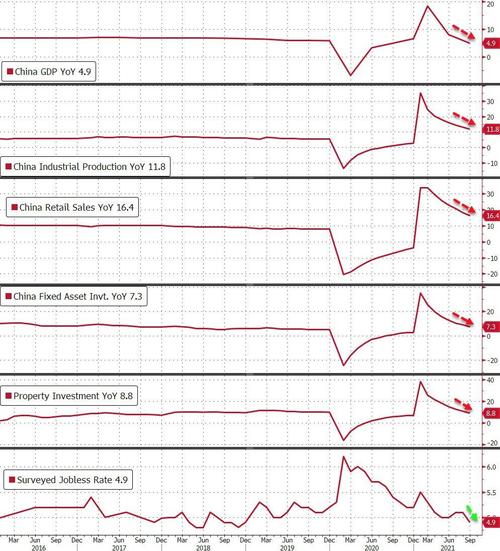Facing a "complex and severe domestic and overseas environment", China's stats bureau spokesperson Fu Linghui admitted that economic indicators all weakened in Q3/September.
China 3Q GDP Grows 4.9% Y/Y; Est. 5% - MISS
China Sept. Industrial Output Rises 3.1% Y/Y; Est. 3.8% - MISS
China Jan.-Sept. Fixed Investment Rises 7.3% Y/Y; Est. 7.8% - MISS
China Sept. Retail Sales Rise 4.4% Y/Y; Est. 3.5% - BEAT
GDP growth was a mere 0.2% in the third quarter from the previous three months.
Bank of America's Helen Qiao says on Bloomberg TV that, aside from retail sales, the numbers are all pointing to downside risk -- she especially noted the hit from the energy crunch.
Aside from GDP, all the other Chinese macro indicators continued to slide (except unemployment, which improved to its best since December 2018). It is worth noting that this is the official surveyed rate and doesn't capture the whole jobs market.

Sales of clothing fell 4.8% and automobiles fell almost 12% while furniture was also soft. Catering services rose only 3.1% YoY, a sign that Chinese are not out dining and wining much.
Finally, PPI is likely to stay at high levels for some time, statistics spokesperson Fu says, suggesting little will be done in the short-term from a policy-tightening perspective.
"However, it should also be noted that at present, uncertainties in the international environment are growing, and the domestic economic recovery is still unstable and unbalanced,"
Chang Shu and Eric Zhu at Bloomberg Economics warn that the economy needs a cushion, stating that greater policy support is needed for the economy to pull through the soft patch. But a quick turnaround is unlikely, given the slowdown is being driven predominantly by supply shocks, and the government is committed to driving long-term structural reforms.
Fu said the government will "strive to keep the economic operation within a reasonable range and ensure the completion of the main objectives and tasks of economic and social development."
Bloomberg's Enda Curran warns that it's clear now that the final three months of the year are going to be harder to navigate on so many front. To be clear, China will do what it takes to avoid a hard landing, but it's still a more complicated picture than what many anticipated when the year began.
The bottom line is that China's economy is slowing -- and may slow further from here. Supply challenges are clearly hurting the industrial sector even as retail sales hold up better than expected. Where the overall trajectory goes from here will depend on the energy crunch, consumer confidence and how much support the government will tip into the economy.
Commenti
Posta un commento